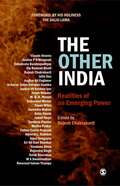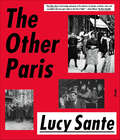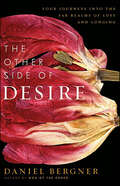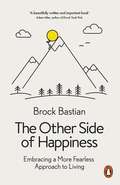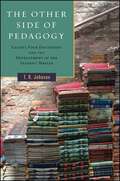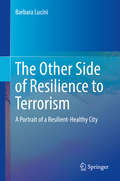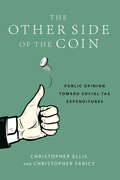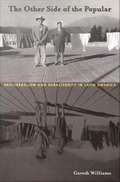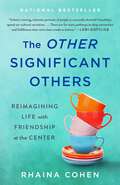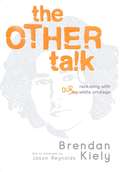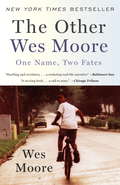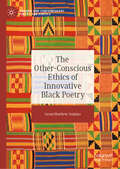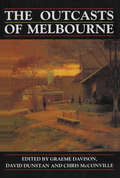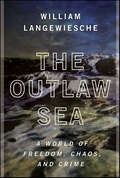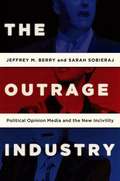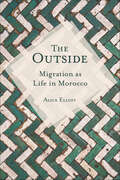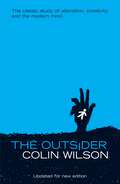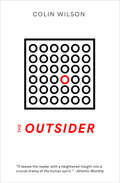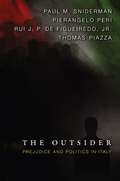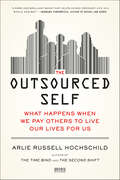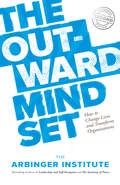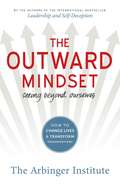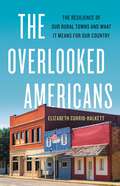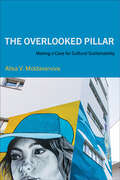- Table View
- List View
The Other India: Realities of an Emerging Power
by Rajesh ChakrabartiThis collection documents and analyzes, from different angles, the forces and trends that shape contemporary India′s socio-economic reality. The contributors comprise an eclectic group—spiritual leaders, grassroot activists, as well as eminent thinkers from diverse fields like the judiciary, social development, environment, education, contemporary science and art. In contrast to the dominant characterization of a "Shining India" in recent years, these articles present a complex and multi-dimensional reality, essential for a balanced, objective understanding of the issues that shape today′s India and indeed the world. The Other India: Realities of an Emerging Power focuses on an India far removed from a country of glass and steel high-rises and air-conditioned schools; glistening malls and multiplexes; and fashion shows, Bollywood and T20 cricket. It explores issues like poverty and social justice; the role of religion in society—from inspiring struggles for social justice to instigating terrorism—the dangers of mindless destruction of nature, violation of human rights and the role of social action. Here dispassionate analysis of history and contemporary forces alternate with straight-from-the-heart narratives of grassroot activists. Candid despair shares space with encouraging stories of collective action bringing about real change. This compilation will hold tremendous appeal for the general reader and will serve as an indispensable reference for policy-makers, academics and thinkers working in the fields of sociology, religion, environment, education, human rights, law and justice, development issues and politics. It is a must-read for anyone trying to get a holistic picture of contemporary India′s dynamic society and economy.
The Other Paris
by Lucy Sante“The Other Paris is both eulogy and paean to the matrixes of anarchy, creativity, crime, and serendipity that once gave shape to the City of Light.” —Anna Wiener, The New RepublicParis, the City of Light, the city of fine dining and seductive couture and intellectual hauteur, was until fairly recently always accompanied by its shadow: the city of the poor, the outcast, the criminal, the eccentric, the willfully nonconforming. In The Other Paris, Lucy Sante gives us a panoramic view of that second metropolis, which has nearly vanished but whose traces are in the bricks and stones of the contemporary city, in the culture of France itself, and, by extension, throughout the world. Drawing on testimony from a great range of witnesses—from Balzac and Hugo to assorted boulevardiers, rabble-rousers, and tramps—Sante, whose thorough research is matched only by the vividness of her narration, takes the reader on a whirlwind tour. Richly illustrated with more than three hundred images, The Other Paris scuttles through the knotted streets of pre-Haussmann Paris, through the improvised accommodations of the original bohemians, through the whorehouses and dance halls and hobo shelters of the old city.A lively survey of labor conditions, prostitution, drinking, crime, and popular entertainment, and of the reporters, réaliste singers, pamphleteers, and poets who chronicled their evolution, The Other Paris is a book meant to upend the story of the French capital, to reclaim the city from the bons vivants and the speculators, and to hold a light to the works and lives of those expunged from its center by the forces of profit.“A wonderfully rich book.” —Allan Massie, The Wall Street Journal
The Other Side of Desire: Four Journeys into the Far Realms of Lust and Longing
by Daniel Bergner“Riveting….Powerful…as much about desire and what’s normal as it is an exploration of why we are the way we are, whether we like it or not.” —New York Times Book ReviewSubtitled “Four Journeys into the Far Realms of Lust and Longing,” Daniel Bergner’s The Other Side of Desire is a literary exploration of science and sex that will appeal to readers of Mary Roach and Natalie Angier. A cross between “a top-rated HBO series [with] provocatively graphic sex, humorous dialogue, and moral ambiguity,” (New York Times) and a profound, deeply humanizing study of sexuality, The Other Side of Desire has been called, “a foray into extreme passion, in quest of the human soul” (O, The Oprah Magazine) and its author, Bergner, “a keen storyteller but above all a humane one” (Salon.com).
The Other Side of Happiness: Embracing a More Fearless Approach to Living
by Dr. Brock Bastian'Required reading ... Brock Bastian expertly picks apart the fundamental idea that humans thrive when they approach pleasure and avoid pain, explaining why hardship sometimes yields richer lives that are laden with meaning, deep social connections, and unexpected bliss' Adam Alter, author of Drunk Tank Pink In today's culture, happiness has become the new marker of success, while hardships are viewed as personal weaknesses, or problems to be fixed. We increasingly try to eradicate pain through medication and by insulating ourselves from risk and offence, despite being the safest generation to have ever lived. Yet in his research, renowned social psychologist Brock Bastian has found that suffering and sadness are neither antithetical to happiness nor incidental to it: they are a necessary ingredient for emotional well-being.Drawing on psychology, neuroscience and internationally acclaimed findings from Bastian's own lab, The Other Side of Happiness encourages us to take a more fearless approach to living. The most thrilling moments of our lives are often balanced on a knife edge between pleasure and pain, whether it is finding your true love, holding your new-born for the first time, finishing a marathon or even plunging into an icy sea. This is because pain and the threat of loss quite literally increase our capacity for happiness, as Bastian reveals, making us stronger, more resilient, more connected to other people and more attuned to what truly matters. Pain even makes us more mindful, since in our darkest moments we are especially focused and aware of the world around us. Our addiction to positivity and the pursuit of pleasure is actually making us miserable. Brock Bastian shows that, without some pain, we have no real way to achieve and appreciate the kind of happiness that is true and transcendent.
The Other Side of Pedagogy: Lacan's Four Discourses and the Development of the Student Writer (SUNY series, Transforming Subjects: Psychoanalysis, Culture, and Studies in Education)
by T. R. JohnsonUniversity classrooms are increasingly in crisis—though popular demands for accountability grow more insistent, no one seems to know what our teaching should seek to achieve. This book traces how we arrived at our current impasse, and it uses Lacan's theory of the four discourses to chart a path forward via an analysis of the freshman writing class. How did we forfeit a meaningful set of goals for our teaching? T. R. Johnson suggests that, by the 1960s, the work of Bergson and Piaget had led us to see student growth as a journey into more and more abstract thought, a journey that will happen naturally if the teacher knows how to stay out of the way. Since the 1960s, we've come to see development, in turn, only as a vague initiation into the academic community. This book, however, offers an alternative tradition, one rooted in Vygotsky and the feminist movement, that defines the developing student writer in terms of a complex, intersubjective ecology, and then, through these precedents, proposes a fully psychoanalytic model of student development. To illustrate his practical use of the four discourses, Johnson draws on a wide array of concepts and a colorful set of examples, including Franz Kafka, Keith Richards, David Foster Wallace, Hannah Arendt, and many others.
The Other Side of Resilience to Terrorism
by Barbara LuciniThis timely treatise introduces an innovative prevention/preparedness model for cities to address and counter terrorist threats and events. It offers theoretical background, mixed-method research, and tools for creating a resilience-based response to terrorism, as opposed to the security-based frameworks commonly in use worldwide. The extended example of Milan as a "resilient-healthy" city pinpoints sociological, political, and economic factors that contribute to terror risk, and outlines how law enforcement and emergency management professionals can adopt more proactive measures. From these observations and findings, the author also makes recommendations for the professional training and city planning sectors to address preparedness issues, and for community inclusion programs to deter criminal activities in at-risk youth. Features of the coverage: Summary of sociological theories of terrorism The Resilience D model for assessing and managing urban terrorist activity Findings on resilience and vulnerabilities of terror groups Photo-illustrated analysis of neighborhoods in Milan, describing areas of risk and resilience Virtual ethnography with perspectives from native residents, recent immigrants, and security experts Proposals for coordinated communications between resource agencies The Other Side of Resilience to Terrorism will hold considerable interest for students, stakeholders, practitioners, and researchers. It makes a worthwhile text for various academic disciplines (e. g. , urban sociology, crisis management) as well as for public agencies and policymakers.
The Other Side of the Coin: Public Opinion toward Social Tax Expenditures
by Christopher Ellis Christopher G. FaricyDespite high levels of inequality and wage stagnation over several decades, the United States has done relatively little to address these problems—at least in part due to public opinion, which remains highly influential in determining the size and scope of social welfare programs that provide direct benefits to retirees, unemployed workers or poor families. On the other hand, social tax expenditures—or tax subsidies that help citizens pay for expenses such as health insurance or the cost of college and invest in retirement plans—have been widely and successfully implemented, and they now comprise nearly 40 percent of the spending of the American social welfare state. In The Other Side of the Coin, political scientists Christopher Ellis and Christopher Faricy examine public opinion towards social tax expenditures—the other side of the American social welfare state—and their potential to expand support for such social investment. Tax expenditures seek to accomplish many of the goals of direct government expenditures, but they distribute money indirectly, through tax refunds or reductions in taxable income, rather than direct payments on goods and services or benefits. They tend to privilege market-based solutions to social problems such as employer-based tax subsidies for purchasing health insurance versus government-provided health insurance. Drawing on nationally representative surveys and survey experiments, Ellis and Faricy show that social welfare policies designed as tax expenditures, as opposed to direct spending on social welfare programs, are widely popular with the general public. Contrary to previous research suggesting that recipients of these subsidies are often unaware of indirect government aid—sometimes called “the hidden welfare state”—Ellis and Faricy find that citizens are well aware of them and act in their economic self-interest in supporting tax breaks for social welfare purposes. The authors find that many people view the beneficiaries of social tax expenditures to be more deserving of government aid than recipients of direct public social programs, indicating that how government benefits are delivered affects people’s views of recipients’ worthiness. Importantly, tax expenditures are more likely to appeal to citizens with anti-government attitudes, low levels of trust in government, or racial prejudices. As a result, social spending conducted through the tax code is likely to be far more popular than direct government spending on public programs that have the same goals. The first empirical examination of the broad popularity of tax expenditures, The Other Side of the Coin provides compelling insights into constructing a politically feasible—and potentially bipartisan—way to expand the scope of the American welfare state.
The Other Side of the Popular: Neoliberalism and Subalternity in Latin America
by Gareth WilliamsDrawing on deconstruction, postcolonial theory, cultural studies, and subaltern studies, The Other Side of the Popular is as much a reflection on the limitations and possibilities for thinking about the politics of Latin American culture as it is a study of the culture itself. Gareth Williams pays particular attention to the close relationship between complex cultural shifts and the development of the neoliberal nation-state. The modern Latin American nation, he argues, was built upon the idea of "the people," a citizenry with common interests transcending demographic and cultural differences. As nations have weakened in relation to the global economy, this moment--of the popular as the basis of nation-building--has passed, causing seismic shifts in the relationships between governments and cultural formations. Williams asserts that these changed relationships necessitate the rethinking of fundamental concepts such as "the popular" and "the nation. " He maintains that the perspective of subalternity is vital to this theoretical project because it demands the reimagining of the connections between critical reason and its objects of analysis. Williams develops his argument through studies of events highlighting Latin America's uneasy, and often violent, transition to late capitalism over the past thirty years. He looks at the Chiapas rebellion in Mexico, genocide in El Salvador, the Sendero in Peru, Chile's and Argentina's transitions to democratic governments, and Latin Americans' migration northward. Williams also reads film, photography, and literary works, including Ricardo Piglia's The Absent City and the statements of a young Salvadoran woman, the daughter of ex-guerrilleros, living in South Central Los Angeles. The Other Side of the Popular is an incisive interpretation of Latin American culture and politics over the last few decades as well as a thoughtful meditation on the state of Latin American cultural studies.
The Other Significant Others: Reimagining Life with Friendship at the Center
by Rhaina CohenNATIONAL BESTSELLERAN INDIE BESTSELLER"The Other Significant Others…fundamentally, it's become my new Bible.” — Trevor Noah"An arresting work of compassion and insight." ―Lori Gottlieb"I loved and recommend [The Other Significant Others] to everybody." —Ezra Klein "I feel like I've been waiting for this book for my entire adult life." ―Anne Helen PetersenWhy do we assume romantic relationships are more important than friendships? What do we lose when we expect a spouse to meet all our needs? And what can we learn about commitment, love, and family from people who put deep friendship at the center of their lives?In The Other Significant Others, NPR's Rhaina Cohen invites us into the lives of people who have defied convention by choosing a friend as a life partner—these are friends who are home co-owners, co-parents or each other’s caregivers. Their riveting stories unsettle widespread assumptions about relationships, including the idea that sex is a defining feature of partnership and that people who raise kids together should be in a romantic relationship. Platonic partners from different walks of life—spanning age and religion, gender and sexuality and more—reveal how freeing and challenging it can be to embrace a relationship model that society doesn't recognize. And they show that orienting your world around friends isn't limited to daydreams and episodes of The Golden Girls, but actually possible in real life.Based on years of original reporting and striking social science research, Cohen argues that we undermine romantic relationships by expecting too much of them, while we diminish friendships by expecting too little of them. She traces how, throughout history, our society hasn’t always fixated on marriage as the greatest source of meaning, or even love. At a time when many Americans are spending large stretches of their lives single, widowed or divorced, or feeling the effects of the "loneliness epidemic," Cohen insists that we recognize the many forms of profound connection that can anchor our lives. A rousing and incisive book, The Other Significant Others challenges us to ask what we want from our relationships—not just what we’re supposed to want—and transforms how we define a fulfilling life.
The Other Talk: Reckoning with Our White Privilege
by Brendan KielyAward-winning and New York Times bestselling author Brendan Kiely starts a conversation with white kids about race in this accessible introduction to white privilege and why allyship is so vital. Talking about racism can be hard, but... Most kids of color grow up talking about racism. They have &“The Talk&” with their families—the honest talk about survival in a racist world. But white kids don&’t. They&’re barely spoken to about race at all—and that needs to change. Because not talking about racism doesn&’t make it go away. Not talking about white privilege doesn&’t mean it doesn&’t exist. The Other Talk begins this much-needed conversation for white kids. In an instantly relatable and deeply honest account of his own life, Brendan Kiely offers young readers a way to understand one&’s own white privilege and why allyship is so vital, so that we can all start doing our part—today.
The Other Wes Moore: One Name, Two Fates
by Wes MooreThe chilling truth is that his story could have been mine. The tragedy is that my story could have been his.<P><P> Two kids named Wes Moore were born blocks apart within a year of each other. Both grew up fatherless in similar Baltimore neighborhoods and had difficult childhoods; both hung out on street corners with their crews; both ran into trouble with the police. How, then, did one grow up to be a Rhodes Scholar, decorated veteran, White House Fellow, and business leader, while the other ended up a convicted murderer serving a life sentence? Wes Moore, the author of this fascinating book, sets out to answer this profound question. In alternating narratives that take readers from heart-wrenching losses to moments of surprising redemption, The Other Wes Moore tells the story of a generation of boys trying to find their way in a hostile world.<P> BONUS: This edition contains a new afterword and a The Other Wes Moore discussion guide.
The Other-Conscious Ethics of Innovative Black Poetry (Modern and Contemporary Poetry and Poetics)
by Grant Matthew JenkinsThis monograph identifies and investigates the ‘other-conscious’ ethics in black avant-garde poetry since the 1980s. Drawing on a long tradition in the African Diaspora of ethical writings that put the Other first, this work shows how black poets writing in an avant garde or experimental vein in the United States push language to its limits to reveal how poetry can address and exemplify ethical postures towards other people. This other-centered vantage allows the poets to incisively comment on some of this period’s most pressing ethical issues, including postcolonial and racialized violence, the history of slavery and segregation in America, and the expansion of human consciousness. The writers involved in this study include Nathaniel Mackey, Erica Hunt, Will Alexander, Harryette Mullen, and Mark McMorris.
The Outcasts of Melbourne: Essays in social history
by Graeme Davison; David Dunstan; Chris McConvilleBehind the glittering image of 'Marvellous Melbourne' there existed in the popular imagination another, very different, picture of the colonial metropolis. This was the city of 'low life', of crowded slums, poverty, disease and vice.The nine essays in The Outcasts of Melbourne attempt to reveal the social realities behind this picture. They include new accounts of the forces which created the city's physical environment. They show how perceptions of a city can be shaped by campaigning journalists, artists and writers. They present collective portraits of the poor and the 'criminal classes' - and of those who set out to save them. They describe how the city's guardians - the police, public health authorities and charity workers - responded to the challenge of the slums.By imaginative use of the rich deposits in the public records, these explorations in social history present new ways of documenting the lives of people whose daily activities were seldom reported in the popular press. In doing so, they also map the chains of causation which link the actions of individuals - appearing before a committee of a benevolent society, getting arrested, evangelising at a Salvation Army rally - to the social forces which have shaped the cities in which we live.
The Outlaw Sea: A World of Freedom, Chaos, and Crime
by William LangewiescheThe open ocean--that vast expanse of international waters--spreads across three-fourths of the globe. It is a place of storms and danger, both natural and manmade. And at a time when every last patch of land is claimed by one government or another, it is a place that remains radically free. With typically understated lyricism, William Langewiesche explores this ocean world and the enterprises--licit and illicit--that flourish in the privacy afforded by its horizons. But its efficiencies are accompanied by global problems--shipwrecks and pollution, the hard lives and deaths of the crews of the gargantuan ships, and the growth of two pathogens: a modern and sophisticated strain of piracy and its close cousin, the maritime form of the new stateless terrorism.This is the outlaw sea that Langewiesche brings startlingly into view. The ocean is our world, he reminds us, and it is wild.
The Outrage Industry: Political Opinion Media And The New Incivility (Studies In Postwar American Political Development)
by Jeffrey M. Berry Sarah SobierajIn early 2012, conservative radio host Rush Limbaugh claimed that Sandra Fluke, a Georgetown University law student who advocated for insurance coverage of contraceptives, "wants to be paid to have sex." Over the next few days, Limbaugh attacked Fluke personally, often in crude terms, while a powerful backlash grew, led by organizations such as the National Organization for Women. But perhaps what was most notable about the incident was that it wasn't unusual. From Limbaugh's venomous attacks on Fluke to liberal radio host Mike Malloy's suggestion that Bill O'Reilly "drink a vat of poison... and choke to death," over-the-top discourse in today's political opinion media is pervasive. <p><p> Anyone who observes the skyrocketing number of incendiary political opinion shows on television and radio might conclude that political vitriol on the airwaves is fueled by the increasingly partisan American political system. But in The Outrage Industry Jeffrey M. Berry and Sarah Sobieraj show how the proliferation of outrage-the provocative, hyperbolic style of commentary delivered by hosts like Ed Schultz, Bill O'Reilly, and Sean Hannity- says more about regulatory, technological, and cultural changes, than it does about our political inclinations. <p> Berry and Sobieraj tackle the mechanics of outrage rhetoric, exploring its various forms such as mockery, emotional display, fear mongering, audience flattery, and conspiracy theories. They then investigate the impact of outrage rhetoric-which stigmatizes cooperation and brands collaboration and compromise as weak-on a contemporary political landscape that features frequent straight-party voting in Congress. Outrage tactics have also facilitated the growth of the Tea Party, a movement which appeals to older, white conservatives and has dragged the GOP farther away from the demographically significant moderates whose favor it should be courting. <p> Finally, The Outrage Industry examines how these shows sour our own political lives, exacerbating anxieties about political talk and collaboration in our own communities. Drawing from a rich base of evidence, this book forces all of us to consider the negative consequences that flow from our increasingly hyper-partisan political media.
The Outside: Migration as Life in Morocco (Public Cultures Of The Middle East And North Africa Ser.)
by Alice ElliotWhat does migration look like from the inside out? In The Outside, Alice Elliot decenters conventional approaches to migration by focusing on places of departure rather than arrival and rethinks migration from the perspective of those who have not (yet) left. Through an intimate ethnography of towns and villages notorious in Morocco for their striking emigration to "the outside," Elliot traces the powerful ways migration permeates life: as brutal bureaucratic machinery administering hope and despair, as intimate force crisscrossing kinship relations and bonds of love and care, as imaginative horizon of the self and of the future. Challenging dominant understandings of migration and their deadly consequences by centering non-migrants' sharp theorizations and intimate experiences of "the outside," Elliot recasts migration as a deeply relational entity, and attends to the ethnographic, conceptual, and political imagination required by the constitutive relationship between migration and life.
The Outsider
by Colin WilsonThe classic study of alienation, creativity and the modern mind'Excitingly written, with a sense of revelation' GUARDIAN'Exhaustive, luminously intelligent' OBSERVERTHE OUTSIDER was an instant literary sensation when it was first published in 1956, thrusting its youthful author into the front rank of contemporary writers and thinkers. Wilson rationalised the psychological dislocation so characteristic of Western creative thinking into a coherent theory of alienation, and defined those affected by it as a type: the outsider. Through the works and lives of various artists, including Kafka, Camus, Hemingway, Hesse, Lawrence, Van Gogh, Shaw, Nietzsche and Dostoevsky, Wilson explored the psyche of the outsider, his effect on society and society's on him. Nothing that has happened in the decades since has made THE OUTSIDER any less relevant; it remains the seminal work on this most persistent of modern-day preoccupations.
The Outsider
by Colin WilsonThe classic study of alienation, creativity and the modern mind'Excitingly written, with a sense of revelation' GUARDIAN'Exhaustive, luminously intelligent' OBSERVERTHE OUTSIDER was an instant literary sensation when it was first published in 1956, thrusting its youthful author into the front rank of contemporary writers and thinkers. Wilson rationalised the psychological dislocation so characteristic of Western creative thinking into a coherent theory of alienation, and defined those affected by it as a type: the outsider. Through the works and lives of various artists, including Kafka, Camus, Hemingway, Hesse, Lawrence, Van Gogh, Shaw, Nietzsche and Dostoevsky, Wilson explored the psyche of the outsider, his effect on society and society's on him. Nothing that has happened in the decades since has made THE OUTSIDER any less relevant; it remains the seminal work on this most persistent of modern-day preoccupations.
The Outsider: A Study Of Sexual Outsiders (Picador Bks. #Vol. 6)
by Colin WilsonThe classic study of alienation, existentialism, and how great artists have portrayed characters who exist on the margins of society. Published to immense acclaim in the mid-1950s, The Outsider helped make popular the literary concept of existentialism. Authors like Sartre, Kafka, Hemingway, and Dostoyevsky, as well as artists like Van Gogh and Nijinsky, delved for a deeper understanding of the human condition in their work, and Colin Wilson&’s landmark book encapsulated a character found time and time again: the outsider. How does the outsider influence society? And how does society influence him? It&’s a question as relevant to today&’s iconic characters, from Don Draper to Voldemort, as it was when The Outsider was initially published. A fascinating study blending philosophy, psychology, and literature, Wilson&’s seminal work is a must-have for those who are fascinated by the character of the outsider. &“Luminously intelligent . . . A real contribution to our understanding of our deepest predicament.&” —Philip Toynbee &“Leaves the reader with a heightened insight into a crucial drama of the human spirit.&” —Atlantic Monthly
The Outsider: Prejudice and Politics in Italy
by Paul M. Sniderman Thomas Piazza Pierangelo Peri Rui J.P. de FigueiredoOne of the most wide-ranging studies of prejudice undertaken in a decade, The Outsider combines new research methods and rich analysis to upend many of our assumptions about prejudice. Noting that hostility toward immigrants has been on the rise throughout Western Europe, Paul Sniderman and his team conduct the first study of prejudice in Italy and offer insights applicable to nearly all countries worldwide. The study of prejudice, they argue, has been both stimulated and limited by tensions among partial theories. Prejudice and group conflict are said to be rooted in the psychological makeup of individuals, or alternatively, to spring from real competition over material goods or social status, or yet again, to follow in the wake of a quest for identity. It is the distinctive effort of The Outsider to develop a unified theory of prejudice integrating personality, realistic conflict, and social identity approaches. Drawing on computer-assisted interviewing, this book focuses on Italy partly because it has experienced two different waves of immigration, from Northern Africa and Eastern Europe, and thus allows one to consider to what extent the color of immigrants' skin imposes a special burden of prejudice. Italy is also an apt site for the study of intolerance because of long-standing prejudices that have existed internally, between Northern and Southern Italians. The book's findings show that any point of difference--color, nationality, or language--marks the immigrant as an outsider. The fact of difference, not the particular mode of difference, is crucial. Moreover, the general election of 1994 provided a rare opportunity to investigate the political impact of prejudice when the party system was itself in the process of transformation. The authors uncover a potential line of cleavage: rather than prejudice being concentrated on the political right, it has a wide following among the less educated of the political left. Analyzing the contributions of personality, social-structural factors, and political orientation to the wave of intolerance toward immigrants, The Outsider offers unprecedented insights into the phenomenon of prejudice and its link to politics.
The Outsourced Self: What Happens When We Pay Others to Live Our Lives for Us
by Arlie Russell HochschildFrom the famed author of the bestselling The Second Shift and The Time Bind, a pathbreaking look at the transformation of private life in our for-profit worldThe family has long been a haven in a heartless world, the one place immune to market forces and economic calculations, where the personal, the private, and the emotional hold sway. Yet as Arlie Russell Hochschild shows in The Outsourced Self, that is no longer the case: everything that was once part of private life—love, friendship, child rearing—is being transformed into packaged expertise to be sold back to confused, harried Americans.Drawing on hundreds of interviews and original research, Hochschild follows the incursions of the market into every stage of intimate life. From dating services that train you to be the CEO of your love life to wedding planners who create a couple's "personal narrative"; from nameologists (who help you name your child) to wantologists (who help you name your goals); from commercial surrogate farms in India to hired mourners who will scatter your loved one's ashes in the ocean of your choice—Hochschild reveals a world in which the most intuitive and emotional of human acts have become work for hire.Sharp and clear-eyed, Hochschild is full of sympathy for overstressed, outsourcing Americans, even as she warns of the market's threat to the personal realm they are striving so hard to preserve.
The Outward Mindset: How to Change Lives and Transform Organizations
by The Arbinger InstituteThe new edition of an international bestseller helps individuals and organizations shift to a new mindset that will improve performance, spark collaboration, accelerate innovation, and make your life and the lives of everyone around you better.Without even being aware of it, many of us operate from an inward mindset, a single-minded focus on our own goals and objectives. This book points out the many ways, some quite subtle and deceptive, that this mindset invites tension and conflict. But incredible things happen when people switch to an outward mindset. They intuitively understand what coworkers, colleagues, family, and friends need to be successful and happy. Their organizations thrive, and astonishingly, by focusing on others they become happier and more successful themselves! This new mindset brings about deep and far-reaching changes. The Outward Mindset presents compelling true stories to illustrate the gaps that individuals and organizations typically experience between their actual inward mindsets and their needed outward mindsets. And it provides simple yet profound guidance and tools to help bridge this mindset gap. This new edition includes a new preface, updated case studies, and new material covering Arbinger's latest research on mindsets. In the long run, changing negative behavior without changing one's mindset doesn't last—the old behaviors always reassert themselves. But changing the mindset that causes the behavior changes everything.
The Outward Mindset: Seeing Beyond Ourselves
by The Arbinger InstituteUnknowingly, too many of us operate from an inward mindset--a narrow-minded focus on self-centered goals and objectives. When faced with personal ineffectiveness or lagging organizational performance, most of us instinctively look for quick-fix behavioral band-aids, not recognizing the underlying mindset at the heart of our most persistent challenges. Through true stories and simple yet profound guidance and tools, The Outward Mindset enables individuals and organizations to make the one change that most dramatically improves performance, sparks collaboration, and accelerates innovation--a shift to an outward mindset.
The Overlooked Americans: The Resilience of Our Rural Towns and What It Means for Our Country
by Elizabeth Currid-HalkettHow small-town America&’s surprising success reshapes our understanding of the nation&’s urban-rural divide, offering &“the most balanced and broadest-ranging look at the topic&” (Tyler Cowen, George Mason University). The Next Big Idea Club 2023 Must Read Book We are frequently told rural America is in crisis. According to many journalists, academics, and politicians, our small towns have been hollowed out by lost jobs, and residents have turned to opioids and right-wing extremism to cope with their pain and resentment. In fact, many rural towns are thriving. Commentators have fixated on the steep decline of one region—Appalachia—and overlooked the millions of rural Americans who are succeeding in the heartland. In The Overlooked Americans, public policy expert Elizabeth Currid-Halkett reveals that rural America has not been left behind the rest of the nation but instead is surprisingly successful. Drawing on deep research, including data and in-depth interviews, she traces how small towns are doing as well as, or better than, cities by many measures, including homeownership, income, and employment. She also shows how rural and urban Americans share core values, from opposing racism and upholding environmentalism to believing in democracy. Looking everywhere from Missouri to Minnesota to her hometown of Danville, Pennsylvania, Currid-Halkett ultimately reveals that the nation is less fractured by geography than many believe. This is an urgent appeal for Americans to reconnect across a rural-urban divide that isn&’t so wide after all.
The Overlooked Pillar: Making a Case for Cultural Sustainability
by Alisa V. MoldavanovaOffering an original perspective on the sustainable-development discourse by emphasizing the importance of culture and cultural institutions in facilitating societal sustainability goals, The Overlooked Pillar conceptualizes sustainability as an institutional logic that develops in organizations and is enacted by managers of such organizations who make decisions and engage in sustainable thinking on a daily basis, leading them to reconcile current organizational realities and the need to adapt to those realities with considerations of the needs of future generations. Drawing on more than five years of research conducted on a variety of organizations within the domain of the arts and humanities, Alisa V. Moldavanova provides a framework for organizational sustainability based on the dynamic interplay of two narratives—institutional resilience and institutional distinctiveness—and identifies mechanisms and strategies adopted by managers of cultural organizations that maintain and enhance intergenerational sustainability. The broader intellectual implication of the insights offered here encompasses the critical notion that genuine long-term sustainability, the kind that secures the rights of future generations, requires sustainable stewardship today.
